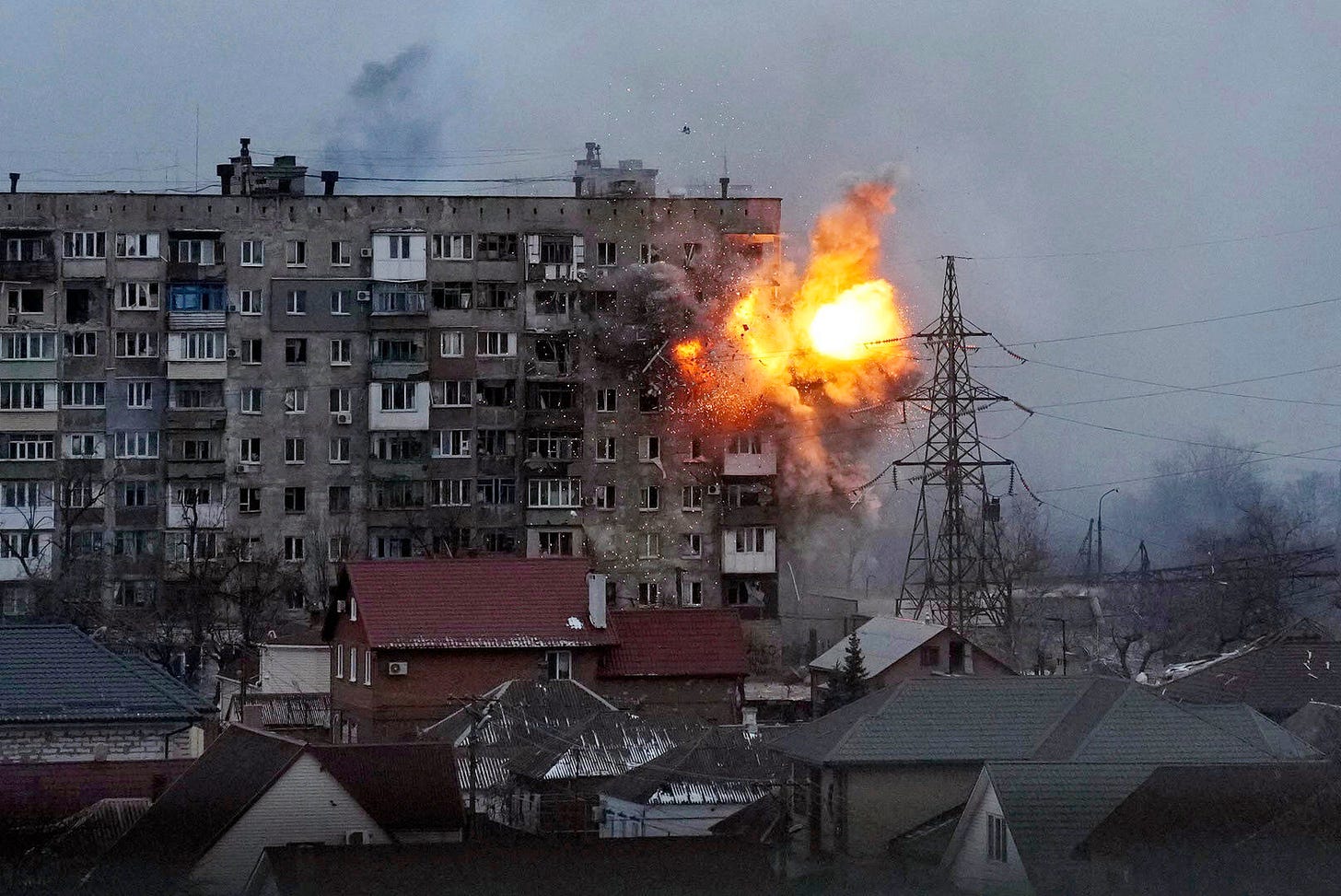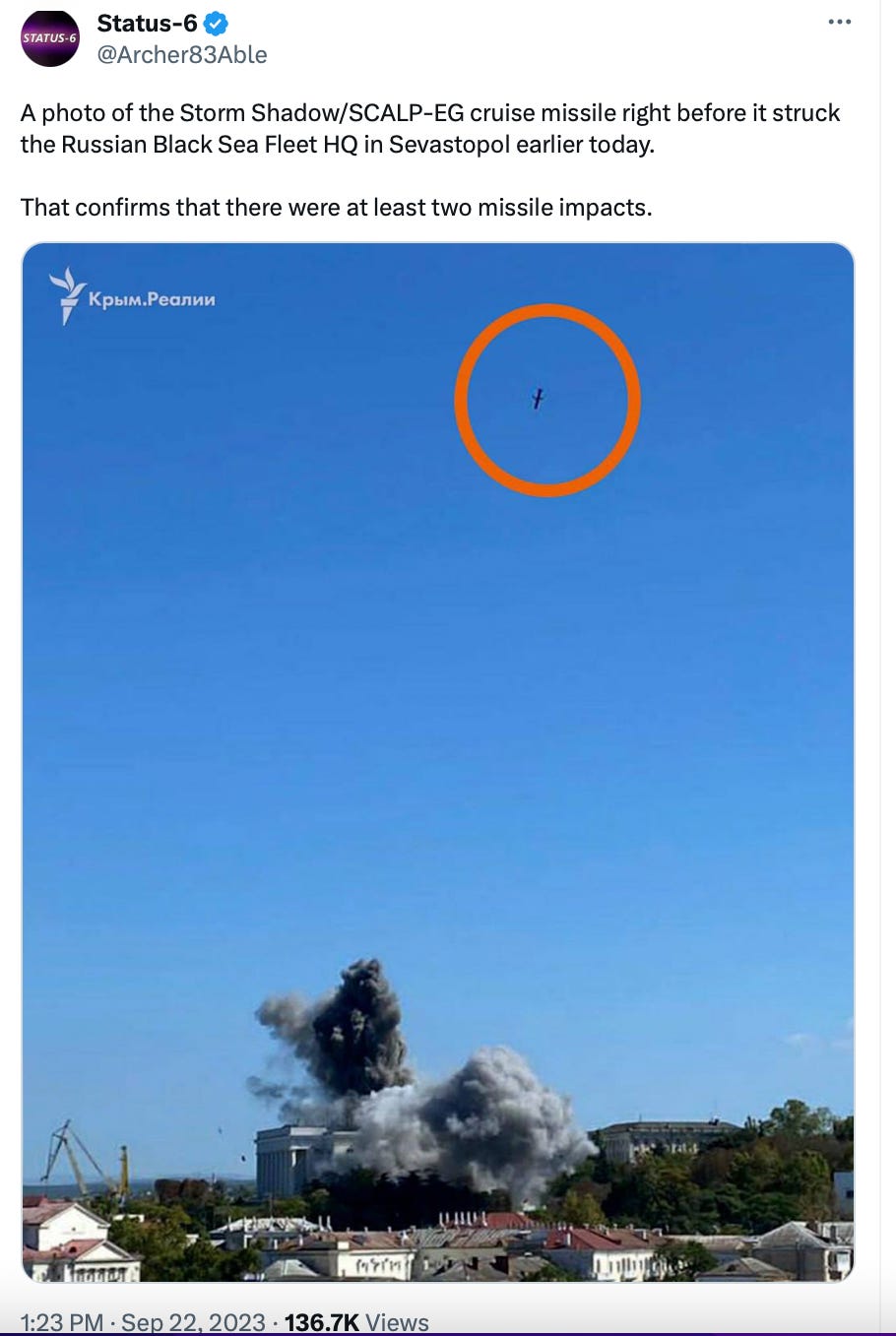Two Sets of Airstrikes Explain the War
Russia targeted civilian infrastructure and Ukraine targeted a naval headquarters, highlighting the moral and strategic differences that make Ukraine worth supporting
Two sets of airstrikes in Ukraine this week highlight the moral and strategic differences of the war’s two sides.
Russia’s air assault attacked the southern Ukrainian city of Odesa, on the Black Sea. They targeted civilian infrastructure, damaging ports, grain storage facilities, and the power grid, killing at least four workers. The Ukrainian military says it shot down 19 drones and 11 missiles, but some got through.
Russia’s strategic goal with these strikes is to break Ukraine’s will. Ukraine exports agricultural products, and by targeting grain shipment and storage, Russia aims to harm Ukraine’s economy and cause food insecurity in importers, such as Turkey and Egypt, hoping that shortages and price spikes will get them to push Ukraine to give Russia concessions. In attacking the power grid, Russia primarily aims to make Ukrainians suffer in the coming winter, hoping that it’ll get average Ukrainians to pressure their government to quit.
Odesa grain facility after Russian airstrikes (source)
The same week, Ukraine attacked the headquarters of Russia’s Black Sea fleet in Sevastopol, on the Crimean peninsula. Russia has controlled that port city since illegally occupying Crimea in 2014, and uses ships based in Sevastopol to harass commercial vessels and launch missiles against Ukrainian cities, including Odesa. Photos show what appears to be a UK/France-provided Storm Shadow/SCALP-EG missile flying into the headquarters as smoke is already rising, indicating at least two hits.
Ukraine apparently timed the attack to a meeting of military leaders, and killed or injured dozens. Reportedly among the seriously wounded is Col. Gen. Alexander Romanchuk, the commander of Russian ground forces in Zaporizhzhia, where Ukraine’s counteroffensive is making its biggest push. There are conflicting claims about Admiral Viktor Sokolov, commander of Russia’s Black Sea fleet, but even if he’s alive and well, the strikes disrupted Russian command and control.
Morally and legally, the difference between these sets of airstrikes is clear. Russia is a foreign aggressor, and targeted civilians on Ukrainian territory. Ukraine struck military targets on occupied territory, an act of self-defense.
But the strikes also show how Ukraine’s military strategy is more sophisticated.
About a week before Ukraine hit the naval headquarters, they destroyed advanced Russian air defense systems in Crimea. According to BBC reports, Ukraine first took out radar with small, hard-to-spot drones, then destroyed the blinded S300 and S400 anti-air missile batteries (worth an estimated $1.2 billion) with Ukraine-made Neptune cruise missiles (which cost about $500k each).
Smart Strategy Deserves Support
As Russian and Ukrainian forces engage in grinding combat at multiple locations along the 600-mile front, both launch airstrikes behind enemy lines. Russia is going after civilian targets, trying to make people suffer, which does little to help its effort to hold off Ukraine’s counteroffensive. Meanwhile, Ukraine goes after military targets, trying to disrupt command, communications, and supply, which helps its effort to break through Russia’s prepared defenses.
Ukraine’s fight to keep its independence is easily more legitimate than Russia’s fight to subjugate its neighbor. Rarely do the laws and morality of war—regarding both start of and conduct during—favor one side of a conflict this clearly.
But while that moral and legal clarity makes Ukraine a righteous cause, it is not, on its own, a sufficient argument for the US and other NATO countries to keep sending billions of dollars worth of military aid. Propping up a righteous but futile effort would be a mistake, costing lives and resources with no chance of success.
Ukraine, however, has already stopped and partially reversed Russian advances. Russia may be bigger and more powerful, but with greater morale and smarter strategy—and a steady stream of external supply—Ukraine can, in time, achieve more.
Ukraine is worth backing, not only because that supports a moral cause, and defends bedrock international law and norms against aggressive war. And not only because the survival of a European democracy and weakening of Russia’s military capacity are in US/NATO strategic interest. But also because, as this week’s competing airstrikes show, Ukraine is fighting smarter.





Even with the invasion and war for the independence of Ukraine from Russia having gone on this long, it is important that we maintain moral clarity about it and a clear-eyed perspective. So it is for this reason that I keep reading pieces like this, even though I know it all myself already in my own mind. For the succinct summation that it is and to show my support for the people that are using their writing talents for the good guys. We in the democracy-supporting West need to prevail. We must prevail. And we need the full court press of the creative minds, as well as the military to keep on supporting the war effort.